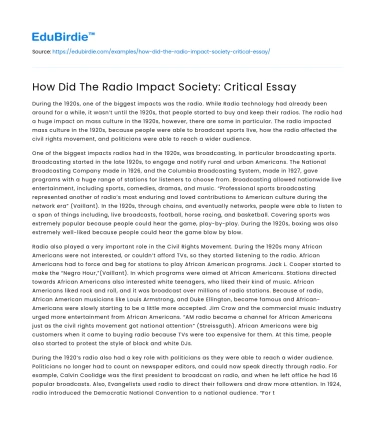During the 1920s, one of the biggest impacts was the radio. While Radio technology had already been around for a while, it wasn’t until the 1920s, that people started to buy and keep their radios. The radio had a huge impact on mass culture in the 1920s, however, there are some in particular. The radio impacted mass culture in the 1920s, because people were able to broadcast sports live, how the radio affected the civil rights movement, and politicians were able to reach a wider audience.
One of the biggest impacts radios had in the 1920s, was broadcasting, in particular broadcasting sports. Broadcasting started in the late 1920s, to engage and notify rural and urban Americans. The National Broadcasting Company made in 1926, and the Columbia Broadcasting System, made in 1927, gave programs with a huge range of stations for listeners to choose from. Broadcasting allowed nationwide live entertainment, including sports, comedies, dramas, and music. “Professional sports broadcasting represented another of radio’s most enduring and loved contributions to American culture during the network era” (Vaillant). In the 1920s, through chains, and eventually networks, people were able to listen to a span of things including, live broadcasts, football, horse racing, and basketball. Covering sports was extremely popular because people could hear the game, play-by-play. During the 1920s, boxing was also extremely well-liked because people could hear the game blow by blow.
Radio also played a very important role in the Civil Rights Movement. During the 1920s many African Americans were not interested, or couldn’t afford TVs, so they started listening to the radio. African Americans had to force and beg for stations to play African American programs. Jack L. Cooper started to make the “Negro Hour,”(Vaillant). In which programs were aimed at African Americans. Stations directed towards African Americans also interested white teenagers, who liked their kind of music. African Americans liked rock and roll, and it was broadcast over millions of radio stations. Because of radio, African American musicians like Louis Armstrong, and Duke Ellington, became famous and African-Americans were slowly starting to be a little more accepted. Jim Crow and the commercial music industry urged more entertainment from African Americans. “AM radio became a channel for African Americans just as the civil rights movement got national attention” (Streissguth). African Americans were big customers when it came to buying radio because TVs were too expensive for them. At this time, people also started to protest the style of black and white DJs.
During the 1920’s radio also had a key role with politicians as they were able to reach a wider audience. Politicians no longer had to count on newspaper editors, and could now speak directly through radio. For example, Calvin Coolidge was the first president to broadcast on radio, and when he left office he had 16 popular broadcasts. Also, Evangelists used radio to direct their followers and draw more attention. In 1924, radio introduced the Democratic National Convention to a national audience. “For the Democratic Party, the 1924 convention was a bitter, divisive, and exhausting event, the prelude to failure on a national scale in November” (Streissguth). The Democratic Party Convention, in 1924, was the first electronic mass media event, that was carried by a live network of radio stations across the country and followed by thousands of people on their home radio receivers. While the Democrat’s balloting deadlock continued for many days, and delegates for William Gibbs McAffo and delegates for Alred E. Smith, people were able to listen from the convenience of their own houses rather than Madison Square Garden. People discovered that listening to the radio was even better than being there because of how easy it was. The broadcasting of the convention showed that presidents were able to bring everyone together and see what's going on without actually being there.
In conclusion, radio had a huge impact on mass culture in the 1920s. People discovered that they were able to listen to things without having to actually have to see them for themselves. Listening to the radio was very convenient and entertained a lot of people. They could listen to music, comedy shows, dramas, sports, and more. The radio helped a lot of people in the 1920’s and it changed so much. Therefore, radio’s impact in the 1920s was that people were able to broadcast sports live, how radio’s impact affected the civil rights movement, and that politicians were able to reach a wider audience.






 Stuck on your essay?
Stuck on your essay?

